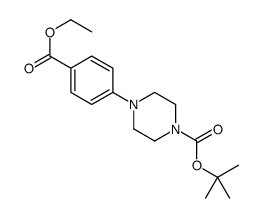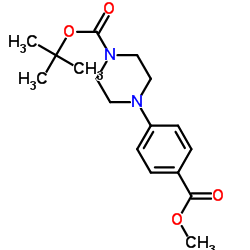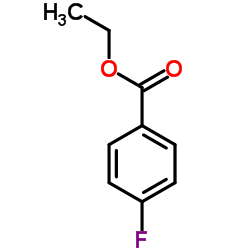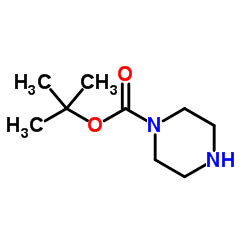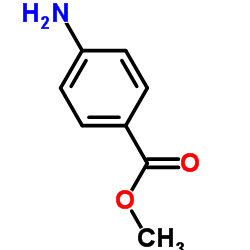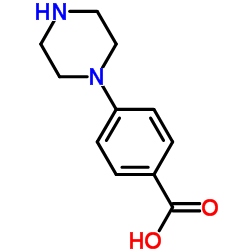162046-66-4
| 中文名 | 4-(4-羧基苯基)哌嗪-1-羧酸叔丁酯 |
|---|---|
| 英文名 | 4-(4-carboxy-phenyl)-piperazine-1-carboxylic acid tert-butyl ester |
| 中文别名 |
4-[4-BOC-哌嗪基]苯甲酸
4-(4-羧基苯基)哌嗪-1-甲酸酸叔丁酯 |
| 英文别名 |
4-[4-(tert-Butoxycarbonyl)piperazin-1-yl]benzoic acid
1-Piperazinecarboxylic acid, 4-(4-carboxyphenyl)-, 1-(1,1-dimethylethyl) ester 4-(4-Carboxyphenyl)piperazine-1-carboxylic acid tert-butyl ester 4-(4-{[(2-Methyl-2-propanyl)oxy]carbonyl}-1-piperazinyl)benzoic acid MFCD04115067 4-(4-Carboxy-phenyl)-piperazine-1-c; arboxylic acid tert-butyl ester 4-[4-[(2-methylpropan-2-yl)oxycarbonyl]piperazin-1-yl]benzoic acid |
| 描述 | Boc哌嗪苯甲酸是一种PROTAC连接剂,可用于合成PROTAC,如PROTAC雄激素受体(AR)降解剂ARD-2128(HY-13229)[1]。 |
|---|---|
| 相关类别 | |
| 体外研究 | ARD-2128是一种高效、口服生物利用的丙酸雄激素受体(AR)降解剂。ARD-2128可有效降低AR蛋白,抑制肿瘤组织中AR调节基因,抑制肿瘤生长而无毒性迹象。ARD-2128具有研究前列腺癌的潜力[1]。 |
| 参考文献 |
| 密度 | 1.2±0.1 g/cm3 |
|---|---|
| 沸点 | 476.9±40.0 °C at 760 mmHg |
| 熔点 | 50ºC |
| 分子式 | C16H22N2O4 |
| 分子量 | 306.357 |
| 闪点 | 242.2±27.3 °C |
| 精确质量 | 306.157959 |
| PSA | 70.08000 |
| LogP | 1.93 |
| 蒸汽压 | 0.0±1.3 mmHg at 25°C |
| 折射率 | 1.561 |
| 储存条件 | 室温,干燥密封 |
Synonym:None Known Section 2 - COMPOSITION, INFORMATION ON INGREDIENTS
Risk Phrases: 20/21/22 36/37/38 Section 3 - HAZARDS IDENTIFICATION EMERGENCY OVERVIEW
Harmful by inhalation, in contact with skin and if swallowed. Irritating to eyes, respiratory system and skin. Potential Health Effects Eye: Causes eye irritation. May cause chemical conjunctivitis. Skin: Causes skin irritation. Harmful if absorbed through the skin. Ingestion: Harmful if swallowed. May cause irritation of the digestive tract. Inhalation: Harmful if inhaled. Causes respiratory tract irritation. Chronic: No information found. Section 4 - FIRST AID MEASURES Eyes: Immediately flush eyes with plenty of water for at least 15 minutes, occasionally lifting the upper and lower eyelids. Get medical aid. Skin: Get medical aid. Flush skin with plenty of water for at least 15 minutes while removing contaminated clothing and shoes. Wash clothing before reuse. Ingestion: Never give anything by mouth to an unconscious person. Get medical aid. Do NOT induce vomiting. If conscious and alert, rinse mouth and drink 2-4 cupfuls of milk or water. Wash mouth out with water. Inhalation: Remove from exposure and move to fresh air immediately. If not breathing, give artificial respiration. If breathing is difficult, give oxygen. Get medical aid. Notes to Physician: Treat symptomatically and supportively. Section 5 - FIRE FIGHTING MEASURES General Information: As in any fire, wear a self-contained breathing apparatus in pressure-demand, MSHA/NIOSH (approved or equivalent), and full protective gear. During a fire, irritating and highly toxic gases may be generated by thermal decomposition or combustion. Extinguishing Media: Use water spray, dry chemical, carbon dioxide, or chemical foam. Section 6 - ACCIDENTAL RELEASE MEASURES General Information: Use proper personal protective equipment as indicated in Section 8. Spills/Leaks: Vacuum or sweep up material and place into a suitable disposal container. Clean up spills immediately, observing precautions in the Protective Equipment section. Avoid generating dusty conditions. Provide ventilation. Section 7 - HANDLING and STORAGE Handling: Minimize dust generation and accumulation. Avoid breathing dust, vapor, mist, or gas. Avoid contact with eyes, skin, and clothing. Keep container tightly closed. Avoid ingestion and inhalation. Use with adequate ventilation. Wash clothing before reuse. Storage: Store in a cool, dry place. Store in a tightly closed container. Section 8 - EXPOSURE CONTROLS, PERSONAL PROTECTION Engineering Controls: Facilities storing or utilizing this material should be equipped with an eyewash facility and a safety shower. Use adequate ventilation to keep airborne concentrations low. Exposure Limits CAS# 162046-66-4: Personal Protective Equipment Eyes: Wear appropriate protective eyeglasses or chemical safety goggles as described by OSHA's eye and face protection regulations in 29 CFR 1910.133 or European Standard EN166. Skin: Wear appropriate protective gloves to prevent skin exposure. Clothing: Wear appropriate protective clothing to prevent skin exposure. Respirators: Follow the OSHA respirator regulations found in 29 CFR 1910.134 or European Standard EN 149. Use a NIOSH/MSHA or European Standard EN 149 approved respirator if exposure limits are exceeded or if irritation or other symptoms are experienced. Section 9 - PHYSICAL AND CHEMICAL PROPERTIES Physical State: Crystalline powder Color: White Odor: Not available. pH: Not available. Vapor Pressure: Not available. Viscosity: Not available. Boiling Point: Not available. Freezing/Melting Point: 50 deg C Autoignition Temperature: Not available. Flash Point: Not available. Explosion Limits, lower: Not available. Explosion Limits, upper: Not available. Decomposition Temperature: Solubility in water: Specific Gravity/Density: Molecular Formula: C16H22N2O4 Molecular Weight: 306.36 Section 10 - STABILITY AND REACTIVITY Chemical Stability: Stable under normal temperatures and pressures. Conditions to Avoid: Incompatible materials, dust generation, excess heat. Incompatibilities with Other Materials: Strong oxidizing agents, strong bases, amines. Hazardous Decomposition Products: Carbon monoxide, oxides of nitrogen, carbon dioxide. Hazardous Polymerization: Has not been reported Section 11 - TOXICOLOGICAL INFORMATION RTECS#: CAS# 162046-66-4 unlisted. LD50/LC50: Not available. Carcinogenicity: 4-[4-(tert-Butoxycarbonyl)piperazino]benzoic acid - Not listed by ACGIH, IARC, or NTP. Section 12 - ECOLOGICAL INFORMATION Section 13 - DISPOSAL CONSIDERATIONS Dispose of in a manner consistent with federal, state, and local regulations. Section 14 - TRANSPORT INFORMATION IATA Shipping Name: TOXIC SOLID, ORGANIC, N.O.S. Hazard Class: 6.1 UN Number: 2811 Packing Group: III IMO Shipping Name: TOXIC SOLID, ORGANIC, N.O.S. Hazard Class: 6.1 UN Number: 2811 Packing Group: III RID/ADR Shipping Name: TOXIC SOLID, ORGANIC, N.O.S. Hazard Class: 6.1 UN Number: 2811 Packing group: III Section 15 - REGULATORY INFORMATION European/International Regulations European Labeling in Accordance with EC Directives Hazard Symbols: XN Risk Phrases: R 20/21/22 Harmful by inhalation, in contact with skin and if swallowed. R 36/37/38 Irritating to eyes, respiratory system and skin. Safety Phrases: S 22 Do not breathe dust. S 26 In case of contact with eyes, rinse immediately with plenty of water and seek medical advice. S 36/37/39 Wear suitable protective clothing, gloves and eye/face protection. WGK (Water Danger/Protection) CAS# 162046-66-4: No information available. Canada None of the chemicals in this product are listed on the DSL/NDSL list. CAS# 162046-66-4 is not listed on Canada's Ingredient Disclosure List. US FEDERAL TSCA CAS# 162046-66-4 is not listed on the TSCA inventory. It is for research and development use only. SECTION 16 - ADDITIONAL INFORMATION N/A |
| 危害码 (欧洲) | Xn: Harmful; |
|---|---|
| 风险声明 (欧洲) | R20/21/22;R36/37/38 |
| 安全声明 (欧洲) | 22-26-36/37/39 |
| 危险品运输编码 | NONH for all modes of transport |
| 海关编码 | 2933599090 |
|
~86% 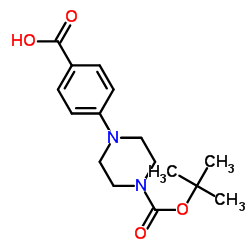
162046-66-4 |
| 文献:THERAVANCE, INC. Patent: US2012/114600 A1, 2012 ; |
|
~% 
162046-66-4 |
| 文献:WO2006/38039 A1, ; Page/Page column 15 ; |
|
~% 
162046-66-4 |
| 文献:Journal of Medicinal Chemistry, , vol. 49, # 3 p. 1165 - 1181 |
|
~% 
162046-66-4 |
| 文献:Journal of Medicinal Chemistry, , vol. 49, # 3 p. 1165 - 1181 |
|
~% 
162046-66-4 |
| 文献:Bioorganic and Medicinal Chemistry, , vol. 14, # 7 p. 2089 - 2108 |
|
~% 
162046-66-4 |
| 文献:Bioorganic and Medicinal Chemistry, , vol. 21, # 15 p. 4646 - 4661 |
|
~% 
162046-66-4 |
| 文献:Bioorganic and Medicinal Chemistry, , vol. 21, # 15 p. 4646 - 4661 |
| 上游产品 7 | |
|---|---|
| 下游产品 2 | |
| 海关编码 | 2933599090 |
|---|---|
| 中文概述 | 2933599090. 其他结构上有嘧啶环的化合物(包括其他结构上有哌嗪环的化合物. 增值税率:17.0%. 退税率:13.0%. 监管条件:无. 最惠国关税:6.5%. 普通关税:20.0% |
| 申报要素 | 品名, 成分含量, 用途, 乌洛托品请注明外观, 6-己内酰胺请注明外观, 签约日期 |
| Summary | 2933599090. other compounds containing a pyrimidine ring (whether or not hydrogenated) or piperazine ring in the structure. VAT:17.0%. Tax rebate rate:13.0%. . MFN tariff:6.5%. General tariff:20.0% |


